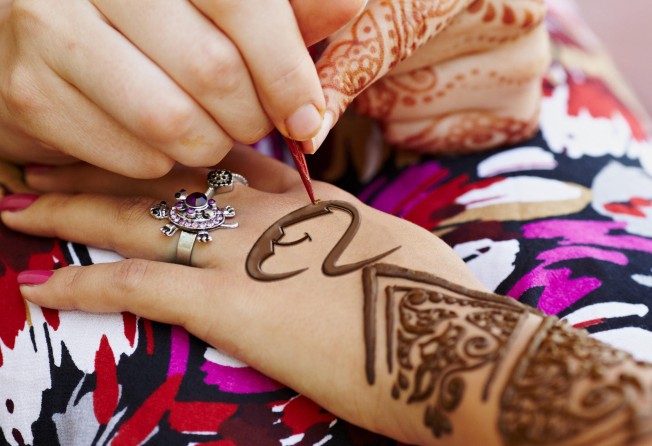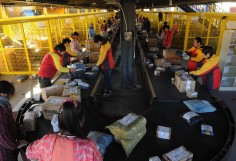
Making a mark
Alibaba has been steadily expanding in markets far from home, with the ranks of Indian suppliers now the second-largest on the B2B site

Niraj Choksi's world revolved around a sweaty little room - before Alibaba opened the door to untold riches.
The tiny corner of his ramshackle home in the boondocks of Mumbai's northern outskirts served as the "factory" of the Choksi family's struggling jewellery business.

Its only workers: Niraj and his brother. They would handcraft the items their mother would design and their father peddle from door to door. Annual turnover: less than US$7,000.Somebody suggested trying the internet to find buyers. "Back then, I didn't even know one can trade online," Choksi said. But he gave it a shot anyway, and signed up with several online platforms.
While none of the other sites led to anything, he had his first inquiry on Alibaba - a buyer from Sweden looking to order 150 bracelets. That was in November 2006. The first online order followed soon after.
DVN Traders employs today more than 1,000 people across nine factories - real industrial facilities. Last year's turnover of the company, which specialises in diamond-studded jewellery, amounted to US$3.5 million. It notched up US$4.2 million in the first half of this year under the able guidance of Choksi, who now goes by the fancy title of director, global sales, marketing and business development.
Alibaba demanded very … detailed information on every product
The Chinese e-commerce giant's exploits in India are not widely known. But with more than 3 million registered members like Choksi, India is home to the second-largest number of suppliers on Alibaba.com after China itself, accounting for nearly a tenth of the business-to-business (B2B) platform's global user base.
Though membership numbers in India have rapidly increased over the years - with a 22 per cent rise last year - Alibaba's presence is difficult to discern outside the realm of small and medium-sized enterprises (SMEs) in which it operates.

With its innovative platform and reputation for connecting buyers and sellers, word of mouth is plentiful. Trichur Shankar Raman, chief executive of Mumbai-based leather products exporter Asian Adores, for example, uses other platforms as well, but he swears by Alibaba.com
"Before Alibaba, we were on Indiamart. But Alibaba screens both suppliers and buyers. Other platforms usually don't do that," Raman said.
Choksi recalls the rigorous scrutiny he underwent.
"We weren't just asked to list our products and upload their pictures. Alibaba demanded very specific and detailed information on every product. Then they checked out our workshop. We felt secure as we realised it would do the same homework with buyers."
Alibaba has long expanded from being a B2B platform to connecting businesses with consumers through Tmall and connecting consumers with other consumers, who buy and sell from one another through Taobao.
Although Tmall and Taobao handled more goods than Amazon and eBay combined last year, these Chinese-language sites are still largely restricted to the home market.
In India, as in most other places outside China, the company is sticking to the B2B model as it believes there is still a huge untapped market in this segment.
A recent study by Google and the Federation of Indian Chambers of Commerce and Industry found fewer than 5 per cent of India's 26 million SMEs had a web presence.
According to Ernst & Young, India's B2B market in 2011 stood at just US$50.37 million, a fraction of a small but rapidly growing domestic e-commerce market of US$10 billion.
Alibaba's model is simple.
"Any SME can join us for free and have its profile verified. But for more advanced services, such as showcasing products, they are required to pay," Isar said.
The company also organises countrywide training sessions with local industry chambers to promote online trading in a country notorious for its low internet penetration.
But even at a penetration rate of less than 16 per cent of the population, India's online users translate into nearly 10 times Australia's population in absolute numbers and are expected to reach 243 million by June next year, overtaking the United States as the world's second-largest internet user base after China.
Isar is understandably upbeat on the prospects. As connectivity spreads, Alibaba stands to collect at both ends of the market. Most buyers from Indian suppliers on the e-commerce site are Indians themselves, at 21 per cent. Other major markets are the US (12 per cent), Britain (4 per cent) and China (4 per cent).
"When I was looking for an app for real-time video images of my factories to monitor them on my mobile phone, guess where I found it? Alibaba," gushes Choksi, who bought the app from a Chennai software developer in 2009.
Isar now sees an upswing in interest from foreign buyers on Alibaba. "India is being recognised as a sourcing hub," he said. "In many industries, including apparel, handicrafts and jewellery, Indian suppliers are much sought after. They offer competitive prices and a lower language barrier. As English is commonly understood here, foreign buyers find dealing with Indian suppliers a lot easier."